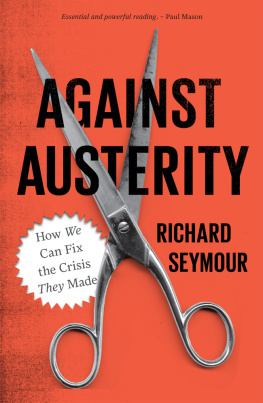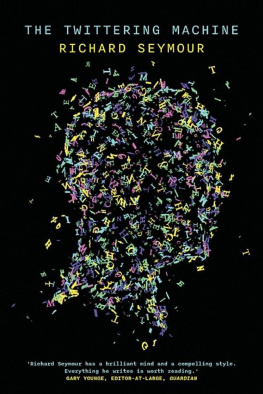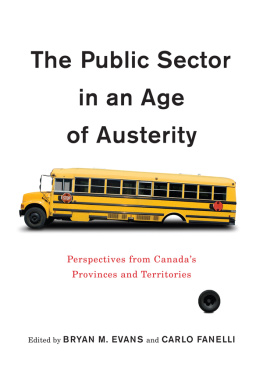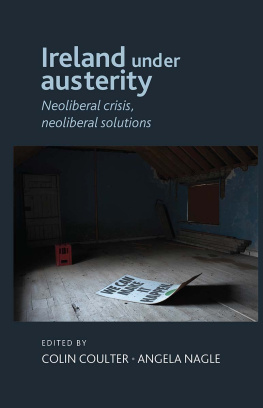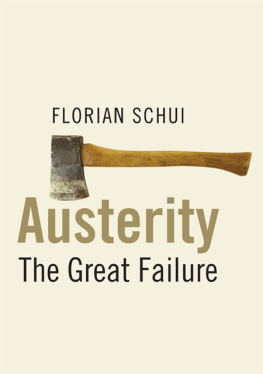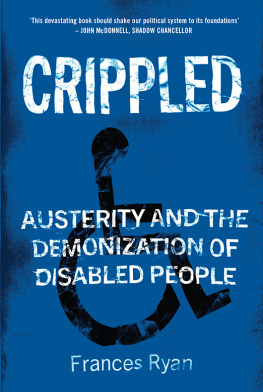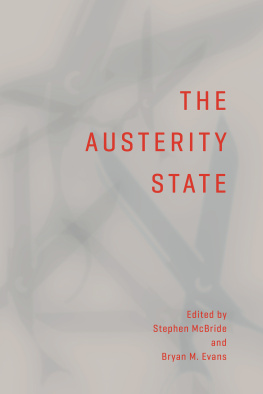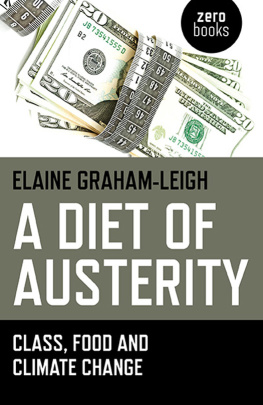Against Austerity
Against Austerity
How We Can Fix the Crisis They Made
Richard Seymour

First published 2014 by Pluto Press
345 Archway Road, London N6 5AA
www.plutobooks.com
Distributed in the United States of America exclusively by
Palgrave Macmillan, a division of St. Martins Press LLC,
175 Fifth Avenue, New York, NY 10010
Copyright Richard Seymour 2014
The right of Richard Seymour to be identified as the author of this work has been asserted by him in accordance with the Copyright, Designs and Patents Act 1988.
British Library Cataloguing in Publication Data
A catalogue record for this book is available from the British Library
ISBN 978 0 7453 3329 8 Hardback
ISBN 978 0 7453 3328 1 Paperback
ISBN 978 1 7837 1019 5 PDF eBook
ISBN 978 1 7837 1021 8 Kindle eBook
ISBN 978 1 7837 1020 1 EPUB eBook
Library of Congress Cataloging in Publication Data applied for
This book is printed on paper suitable for recycling and made from fully managed and sustained forest sources. Logging, pulping and manufacturing processes are expected to conform to the environmental standards of the country of origin.
10 9 8 7 6 5 4 3 2 1
Typeset from disk by Stanford DTP Services, Northampton, England
Text design by Melanie Patrick
Simultaneously printed digitally by CPI Antony Rowe, Chippenham, UK and Edwards Bros in the United States of America
Contents
Preface
If the case for austerity was an email, it would be the rough equivalent of one of those badly spelled inducements to join an organ trafficking ring or give your bank details to a penis enlargement specialist. Most people would have figuratively clicked delete and moved on to some other specimen of the exhausted culture of late capitalism a veritable lolocaust. But the rulers of the world arent so easy to ignore. Their resources are infinitely more sophisticated than spammers, their appeals are insidiously effective, as are the false cues and misdirection.
I hope this book can be useful in disentangling some of this. Each chapter does indeed attempt to unfold the real processes behind the convenient label, austerity. However, it shouldnt be seen as one of the many volumes debunking austerity. The crucial problem which this book addresses is that the current opponents of austerity primarily Left and labour movements are in the main poorly placed to stop it, or even significantly impede it. How can it be, for example, that we have come this far without figuratively, of course ornamenting the major financial centres with the entrails and severed heads of bankers? I said, figuratively. And how is it that, far from expunging this swarm of parasites, we are more dependent on them than ever before? Doesnt such dependency make a mockery of the term parasite?
I think our analysis of what austerity is, how it works, and what strategies can best stop it, has been badly wrong. But it is not simply a question of flawed perspectives this is merely symptomatic. There are a range of political styles on the Left, a set of discursive habits, and models of organisation, which were inherited from past failure. These need to be broken with. This is not a cause for resignation, but for reviewing and rethinking. It is a cause for breaking with consolatory ideology and convenient forgetting. Understanding the problem is an essential part of overcoming it.
I should warn the reader to expect a certain sneering negativity to very occasionally peep through in this book. That is because, well, Im frankly a bit fucked off about all this. Like practically everyone else on the Left, I expected to be able to meet the worst crisis of capitalism in generations with more aplomb than has hitherto been evident. Particularly when our opponents are, as Glen Cullen put it in The Thick of It, a bunch of six-toed, born-to-rule ponyfuckers.
But this is good news. Gramsci said that he didnt like to throw stones in the dark. He needed something to oppose in order to stimulate his thinking about situations, historical controversies, philosophical problems, or political struggles. The advantage of writing a polemical book like this is that there is no danger of throwing stones in the dark. Highly visible targets are everywhere: and as Daphne and Celeste would put it, they aint got no alibi.
There is also a certain familiar use of esoteric political theory and rococo ornamentation that some readers will find off-putting. I hope so anyway. Those readers would be far better off reading something else. (Or, alternatively, stay and have your middlebrow sensibilities challenged.) This book comes with swearing and unapologetic intellectual swagger.
I imagine youre scanning this page while still in the bookshop, calculating whether youd be willing to be seen reading this book on the train. If the above appeals to you, youre probably a bit wrong in some way, but I welcome you. If it doesnt, then make your way to the holy apotheosis of bookshops that is the 3 for 2 section. And buy yet more inconsequential shit with which to line your shelf of good intentions.
Acknowledgements
This book was written with indecent haste and mainly involved solidifying thoughts and ideas that had been developing for some time. But even in that short time, a number of friends provided references, feedback and (goddamn them) criticism. For example, I road-tested some of these ideas in front of a room full of American friends and comrades, who had the good sense to disagree with almost all of them.
China Miville and Rosie Warren provided invaluable, sarcy comments on the drafts huge thanks to them. Thanks also to Sebastian Budgen for an almost daily supply of references, many of which ended up in this book. And above all, thanks to the editor at Pluto Press, David Shulman, who offered kindly and intelligent guidance, and made me take out the jokes that didnt work.
Introduction:
The Bad News Gospel
The crisis creates situations which are dangerous in the short run, since the various strata of the population are not all capable of orienting themselves equally swiftly, or of reorganizing with the same rhythm. The traditional ruling class, which has numerous trained cadres, changes men and programmes and, with greater speed than is achieved by subordinate classes, reabsorbs the control that was slipping from its grasp. Perhaps it may make sacrifices, and expose itself to an uncertain future by demagogic promises; but it retains power, reinforces it for the time being, and uses it to crush its adversary and disperse his leading cadres, who cannot be very numerous or highly trained. Antonio Gramsci.
Rather than witnessing a shift in the balance of class forces toward workers and popular movements, the course of the crisis has favored the capitalist class. Greg Albo, Sam Gindin and Leo Panitch
Five Years of Glorious Failure
The fifth anniversary of the collapse of Lehman Brothers will have passed before this book is published. If, between now and then, the Left has got its shit together, this book will make a nice gift for someone you dont like. In the more probable scenario that it hasnt, I invite the reader to linger on this salient fact. A week is an eternity in politics. Five years of crisis with nothing to show for it is jaw dropping, particularly when set against what might have been expected. This book is thus about a historical missed opportunity, a failure. It accentuates the negative. It is pessimistic. Deal with it.

